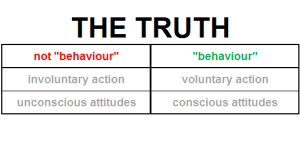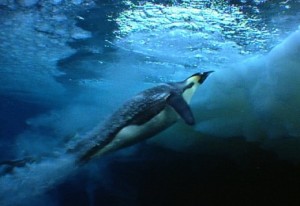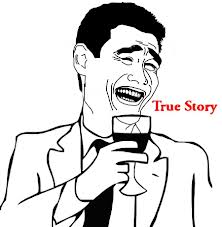… and don’t let anyone try and tell you any different, no matter how much you think they know, or how dreamy their beard is.
If you are at the new level of human behavioural understanding, that is to consider behaviour systemically and from the quantum level outwards, it is glaringly obvious.
The idea that “attitude” is not “behaviour” is akin to the assertion that penguins don’t in any way fly simply because their skills are at play underwater.
So-called “difference between Attitude & Behaviour”
The following is the result of a google search for “difference between attitude and behaviour”, as you can see, common collective knowledge has a massive gulf between the two:
A: Attitudes are thought-based
B: Behaviour is action-based
OR
A: Attitude is internal
B: Behaviour is only external in sense
OR
A: Attitude has no external implication
B: Feeling is poured out in behaviour
Look closely and get ready to forget some information as best you can, because all of the ‘B’ statements (and the last ‘A’ statement) are false.
Here we see yet another example of how our language, our theory and their application trail drearily far behind our actual cumulative cultural evolution – how we need to update things in line with what’s been firmly established as true right now in the present.
If you truly believe no attitude can/should be considered a “behaviour”, answer the following 4 questions…
1. Is liking something an “attitude” or a “behaviour”?
2. Is clicking the ‘Like’ button on facebook with your finger and mouse an “attitude” or a “behaviour”?
3. Is it possible that in the near future you will not have to click anything or move your body overtly in any way whatsoever in order to activate the facebook ‘Like’ button?
4. Has your answer to Question 1 changed?
The actual difference between attitude and behaviour
If you persist with the outdated “science of silos” approach to psychology and you separate things like attitude and behaviour in this day and age, then things like technology and updated collective human knowledge will make you look like somewhat of a tit sooner or later.

It’s simple – conscious attitudes constitute behaviour.
Further, there is an extraordinary body of focused examples peer-reviewed scientific evidence amassing as we speak.
You will hear many people chanting “You change the behaviour you change the attitude” and various other chicken-egg biases that assert one to be more important or influential than the other.
This is a pointless argument that has arisen mainly due to our own inefficient language vocabulary range and selection.
Our lazy dichotomisation of two behaviours as though they were two unrelated phenomena, simply because one type is observable and the other one is invisible to the naked eye.
As is so often the case, an outdated dictionary definition interferes with our cumulative cultural evolution, and we need to update our linguistic expression of a concept so that the old definition can no longer impede our thinking – even if it means pointing out that we’ve all had it wrong all this time.
If we can redefine what the word behaviour means and teach that new definition to emerging generations, they will go much further in their study and application than they will under the current state of quasi-scientific slumber.
A good time to pay homage to a great quote:
“The illiterate of the 21st century will not be those who cannot read and write, but those who cannot learn, unlearn, and relearn,”
– Alvin Toffle
Holding attitudes and behaviour in separate silos only holds us back from the next level of our own collective understanding of ourselves.
In sum,
The illusion of the existence of solid matter (beginning with Aristotle) has led to several commonplace faults in human reasoning, one of which is the dissecting of behaviour into a nice neat pile of visible movements over here, and non-visible movements over there as though they were something qualitatively different.
WATCH:
It’s important to remember that matter does not exist as such. Rather, matter and the concept of solidity is an illusion, “objects” are merely atoms whirring around in gigantic spaces at a certain frequency.
This gives us the illusion that by acting upon objects we are behaving, and in the case when nothing moves that’s detectable by our eyes, nothing is being altered.
The reality is, we as functional thinkers immersed in a systemic ocean of feeling, sentiment, communication and interactivity do actually enact and participate in real changes – chemical, physical, atomic changes – call it “invisibly behavioural transactions” if you will.
As the embodied concentrations of conscious atoms that we are, and the energy fields that we are in turn immersed in, we are both changed chemically by what we feel and how we think about something, and can create the same chemical changes in others across any distance.
In fact, to have an attitude is an internal bodily movement that’s very much physical, it just wasn’t ‘observable’ in the 19th Century when we first started printing publications in great number.
An attitude is an electrical pathway of mental action that moves away from indifference or ambivalence, towards a frequency of decisiveness.
A committed, measurable, sentient action.
A conscious attitude is a behaviour.
As we interact with machines from the digital universe capable of quantifying our mental actions and putting them to use in the neo-economy as part of this new world that’s emerging, each day renders the argument “attitudes are not behaviour” equally as pointless as the dinosaur debate around nature vs nurture.
If you change attitude, you change behaviour, because attitude is behaviour.
No need to feel alarmed or uncomfortable by such fundamental changes in truth, just wo/man-up and take it in your stride that we’ve all been wrong all this time, change your attitude on the subject (pun intended) and come on in for the big win.
After all, as they say, you’re a ghost riding a meat skeleton made of star dust, what have you got to be afraid of?
{ 2 comments }












